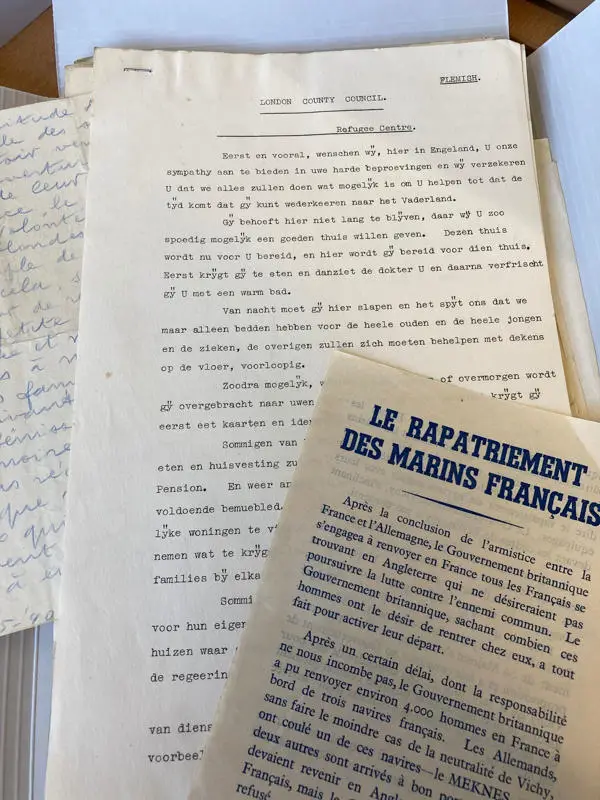Twentieth century welfare from a local government point of view
The responsibilities of the London County Council (LCC) Welfare Department, formerly the Public Assistance Department, expanded significantly during the Council’s lifetime (1889-1965). As a result of the 1929 Local Government Act, the Council took responsibility for the duties of the twenty-five poor law authorities in London and the Metropolitan Asylums Board. These new responsibilities included hospitals, workhouses, children’s homes, homes for elderly people and hostels. During the Second World War the department was stretched further; handling refugees, participating in the evacuation of children and vulnerable people who needed to be evacuated from their homes in London. After the Second World War the introduction of the 1948 National Assistance Act changed the shape of the department once more; with some institutions going into the newly formed National Health Service, and the department having to deal with the longer-term social problems – such as homelessness – that afflicted the post-war city.
The scope and variety of the Welfare Department’s work is vividly illustrated in a large series of policy and subject files which have recently been catalogued. Although these files had been box-listed they weren’t available to search or order from the online catalogue. It was felt that this basic cataloguing could be improved to provide more detail about the files’ contents, with the hope of opening them up to a wider group of researchers – a process we describe as catalogue enhancement. Looking over the files also gave us the chance to reassess any data protection closures (this process comprised checking files for personal information relating to individuals who might still be alive and removing unnecessary 'blanket' closures).
While many of the files are administrative in nature, they offer a rich picture of the type of work undertaken by the department. They usually include correspondence, memoranda, minutes and notes, but they often contain material produced by other bodies. Some of the files contain plans, ephemera and published material. They allow researchers to trace the relationship between Council departments that had to work together – such as Housing, Education and Children’s Services and the voices and attitudes of Welfare Department officers are routinely found in handwritten comments within individual files. On occasion the voices of the individuals the department is trying to help can also be found, something that is quite rare in local authority records.
They are particularly useful for exploring the work of the department during the Second World War and one example of this work includes the reception of refugees from Nazi occupied Europe. Thousands of refugees who fled Belgium and France were received by the LCC at the former Kings’ Canadian Residential Open Air School, Bushy Park, and at the Crystal Palace Reception Centre. The files include detailed information about the practicalities of these arrangements – from ration coupons (LCC/WE/M/10/023), papers kept by the Chief Officer of the Centre, including printed addresses to French refugees and centre newsletters (LCC/WE/M/13/004), daily returns of the number of refugees passing through the centres (LCC/WE/M/12/002) and even details of bicycles retained by the centres on behalf of Belgian refugees who had gone on to more permanent accommodation (LCC/WE/M/10/022 - incredibly the files include the correspondence of cyclists who tried to reclaim their bicycles at a later date).

The Welfare Department was also responsible for the care of blind people in London after the passing of the Blind Persons Act of 1920 and this series includes a large quantity of relevant material, such as files detailing the provision of talking books, specialist sporting facilities and travel concessions (LCC/WE/M/18). There is an extensive series of papers relating to employment opportunities for blind people in London workshops and as homeworkers, as well as files on individual residential homes and voluntary organisations (LCC/WE/M/27 and 28). These files show the extent of the network of facilities for blind Londoners and the quantity of organisations operating in this area as well as the relationship between the LCC and individual charities and voluntary organisations.
There are numerous files concerned with homelessness, and homeless families, particularly in the 1950s and 1960s. It is possible to trace the move away from large institutional facilities, such as the workhouses of the 1920s and 1930s, towards more specialist accommodation in the form of Family Service Units as the Council tried to grapple with the specific problems of homeless families. The files include academic research, correspondence and reports from other local authorities and case studies relating to individual families. There is also an extensive survey of people sleeping on London’s streets in 1963 (LCC/WE/M/40/006) and newspaper clippings relating to homelessness (LCC/WE/M/86/004).
The files continue until the abolition of the LCC in 1965 and include a significant quantity of material relating to the transfer of welfare services and staff to the individual London boroughs, an enormous administrative exercise, though one which highlights the number and variety of welfare establishments managed by the Council. We hope that this catalogue enhancement will highlight the work of the Welfare Department to researchers and encourage further study.
Please be aware that some records from this series are not available for public consultation. Data protection legislation applies to records which contain information about individuals who might still be alive. Please refer to our Collections Access policy on our website for further details.